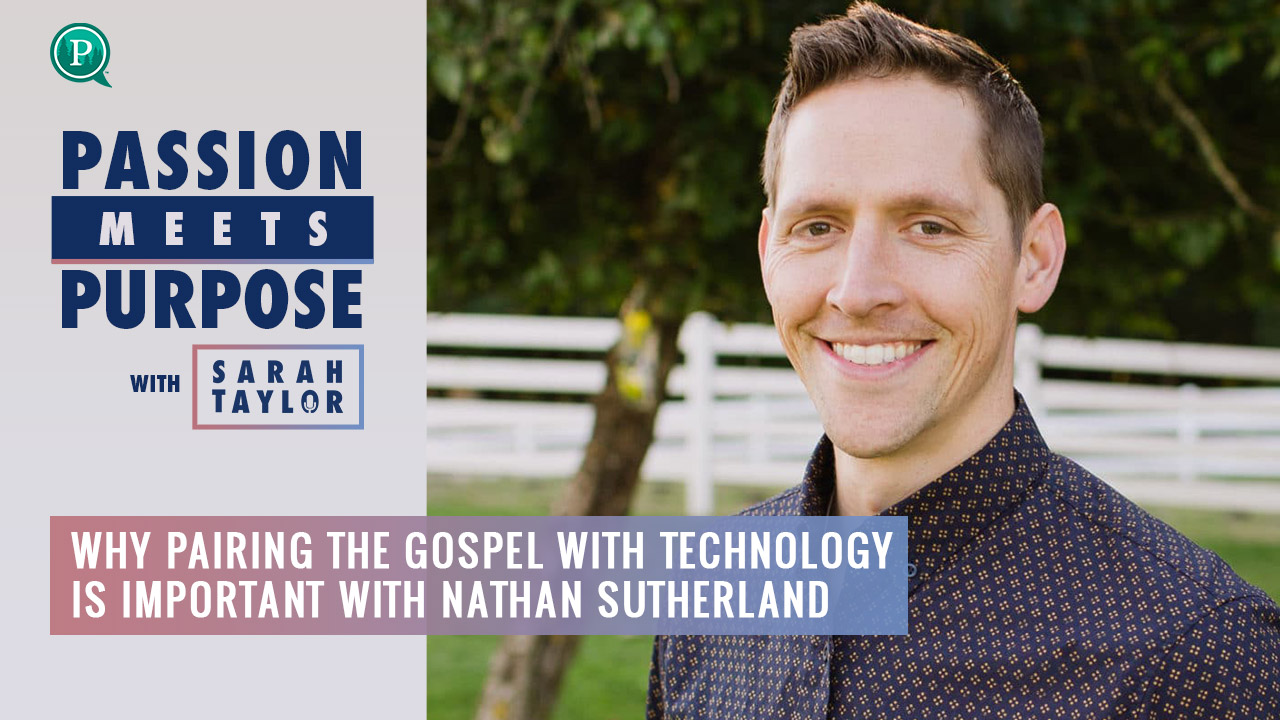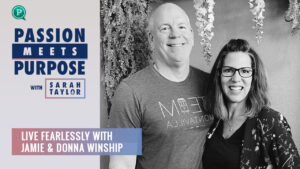What does the Gospel have to do with our use of technology? Nathan Sutherland of Gospel Tech joins Sarah Taylor for a conversation about just that. Why is Nathan passionate about tech and why does he want to make sure we all know the power of the Gospel when we make tech decisions? Find out on this episode! It will change the way you look at technology.
Interview Links:
Find Nathan Online | Instagram | Facebook | Twitter
Transcription:
Nathan [00:00:12] With technology. What the gospel is intended to do is bring hope into the space of saying, “All right, yes, you’re a sinner in need of grace, but you’re saved by that same grace.” That’s what we take to technology. Think about that. If I used just one social media platform with that attitude, that would change the way the planet works.
Sarah [00:00:30] His name is Nathan Sutherland and he is the founder of Gospel Tech, which so fits in line with the Passion Meets Purpose podcast, which is all about finding what you are naturally good at. And then how do you use those talents to give back to the world? This conversation with Nathan was so fruitful because as you can imagine, there’s a lot to talk about in regards to technology and how that interacts with our faith that we’ve divided into two parts for you. This first episode is really the why behind all of it, and next week’s episode is going to be a little bit more like a practical application for use with your family. So both are great. And please welcome my guest, Nathan Sutherland.
Sarah [00:01:09] I like to begin with what you were like as a child because sometimes we’re able to see gifts and talents that the Lord instilled in you at a very young age and how those have really come into fruition now.
Nathan [00:01:23] I don’t think there are any of my elementary school teachers who are surprised to hear that I speak professionally now. If you were to go, “Oh, Nathan Sutherland. Yeah, he’s he’s speaking now.” They wouldn’t be like. “I’m shocked.” I was high energy, very positive. This is the same parent teacher conference I hear with some of my own children. Like, really great with people sometimes has a hard time sticking to the task at hand. And just so growing up, I was the only boy of five kids. So I have two older sisters, two younger sisters, and I found my niche and being sometimes a class clown but gregarious, sometimes people pleasing, but always like loving to be around people extroverted, getting energy from those experiences, even to my own detriment, and the loss of my recess. And that continued as I grew up. I continued to be someone who just yes, I played sports, but I was there for the people, like I wasn’t there for the W. I was there like just to hang out and have a good time and work really hard. And I was in the school plays and I did like I did all those things, but people kept me my passion, which is actually what led me to being a teacher. So when I was a middle school teacher, I got into teaching because I saw my wife teaching. I went to Seattle Pacific. We were living in Ballard back when it was still like small town vibes, and I was like, “Man, I love seeing what she does.” I went and got my master’s degree and when I went to teach like, All right, go middle school and you will know immediately if you should be elementary or high school. Like you’ll just know. But they’re like, “If you’re not 100% against middle schoolers, stay, because there’s something broken in you and that’s the kind of person that needs to stay in middle school.” So I did I was two days in in Puyallup, Washington, and loved it was like, “Oh, my goodness. Like, these people are amazing. I love that they have a sense of humor, but they’re still vulnerable and like, want to be known.” And that’s not to say that other age groups aren’t, but little kids can’t handle sarcasm, and that’s hard. And then older kids, they kind of show you what they think you want to see. It takes a little bit more time to break through. So yeah, I would say that started way back in elementary school with my just love of being around people and God’s really use that to drive me and how I work and why I work with people now.
Sarah [00:03:36] I’ve heard that about middle school before. From even when I did parent teacher conferences when my daughter was in middle school. I remember the science teacher saying, I choose this age because you can still get them excited about science. They’re not too cool yet.
Nathan [00:03:48] Yeah.
Sarah [00:03:49] And so that was he really wanted to like, invest because he could see their potential, which I know is also something that’s huge for you. It’s like your deepest mission is to help youth reach their full potential.
Nathan [00:04:01] Yeah. That’s the reason I woke up every morning, like when people would be like, “Oh, your language arts teacher.” I’m like that’s like a third of what I do. Like, if you go to middle school, you’re not there because you are passionate about the content, which I love Language arts. I’m a double major though history, political science, and that was my jam. I did that for one year and then there was 2008, the economy collapsed, and I got laid off. The one job offered to me was a language arts job, which I had enough credits to actually get those tests done. So I took it. I was teaching like four preps at the time, and I was like, “Great, I guess I’ll just do this.” And then ten years later, I was still doing that because of the kids, because I was so passionate about seeing kids reach the potential. I loved watching young people realize, like I can read or I can understand or I can express myself in speaking and in writing, and I can engage the world in that way. That was so cool to watch like the lights turn on, especially in middle school, when you get these kids who have already made a narrative for themselves, like, I’m broken, I’m damaged, I’m too far gone. Like I’ve done stupid stuff. And it’s just people told me not to and I did it anyway. And to push them back towards hope of like, not like that, that was a mistake and that is bad. Certainly there’s some stuff that comes from that. But like, you’re not too far gone yet. Like there’s always this potential and that’s really when I first stepped out of teaching and started a nonprofit, started talking to kids, there was one talk I give I still give this talk, but it’s just called the Hope Talk. It’s that little choices matter and that’s a good thing. It’s not that don’t make mistakes. If you’re going to be a good person, just never do the wrong thing. Like that’s not the way that works. And the second is that everyone’s got potential. And the third is that it’s never too late to be great. And that last point really being that making a mistake doesn’t make us a mistake. And that was what I loved working with middle schoolers on is like, I get it. You’re at a pivotal point in your life. Like you have tons and tons of crossroads. The friends you’re dating, the food you eat, your sleep habits, your study habits, the way you treat others. Like all that stuff is just in development right now. Like you’re just testing things out and sometimes you’re testing out at the speed of the internet. And we need to be thoughtful about like, is that the decision to make? Because sometimes it’s one decision and it sends you down a path that maybe you didn’t intend to be on.
Sarah [00:06:05] It makes me think of there was a seminar that I took my daughter to, and it was geared mainly toward girls around that age. And the speaker asked all of the the student, she said, “Thoughts, actions, consequences.” Or it might have been emotions, action, consequences. I just know that actions and consequences were in there. But the first one and she said, “Can we control our thoughts? Can we control our emotions?” And it was interesting. You would look around the room and they were trying to come up with the right answer. You know, they’re trying to do I know it or do I shake my head, you know? Yeah. And she was like, “No, Sometimes emotions, sometimes that just come in, you know, we don’t always control this. Can we control our actions?” And the same disillusioned look went around the room. They did not know if we are in control of our actions.
Nathan [00:06:53] Yeah.
Sarah [00:06:54] And that was an eye opener for me. Because, of course, we are in control of our actions, you know? But to them it was not obvious.
Nathan [00:07:04] Yeah. Yeah. Which I think giving them that encouragement. A lot of times when we share that it’s almost condemning. It’s like because you made a mistake, you were in control. And now that almost like defines you. Like now you’re a person who does this thing, right? You’re a kid that fails. You’re a kid that makes mistakes. You’re a kid that got suspended. And I love flipping that. I mean, like, no, like there are choices now in front of you. Like, what are you going to do with the mistakes you’ve already made? Like, and that’s where the gospel is amazing in this. But to understand, like, you’re not defined by your mistakes, like you’re defined by who’s you are, not who you are, and that is the identity you need to be living out of. And so being able to speak to young people, this is the reason I stopped teaching, was recognizing man like language arts is really cool, but I’m so limited and what I want to be able to talk about. I signed a contract saying I would teach to build a fire or whatever story it is. I actually need to like step out and be able to talk to kids about a wider range. And so it started with the bigger nonprofit Flint and Iron where we go, All right, we’re going to talk about sparking purpose in youth and kids, seeing their potential and sharing broad spectrum hope. And then we’re like, you know, we need to share the gospel explicitly. And that’s where gospel tech came from of this idea of like, all right, let’s take the gospel and just drill deep in one really niche category. And technology was that one to see kids, not to not follow the rules of the Old Testament just because the rules, but understand God’s love and wherever rules come from in love. That these are God’s best plan for you. What does it look like now to live from the hope you have in that? Yeah.
Sarah [00:08:36] Let’s go a little deeper on that, because you’ve said before you threw around some other names, right? Obviously, you knew you wanted to get to the gospel, but you thought about healthy tech or hope, hopeful tech or something. But in the end, you landed on the name Gospel Tech for a very intentional reason.
Nathan [00:08:51] Yeah, I got a little cute with some of my names. I was like, How could we like? And at some point that felt disingenuous. I was like, Our goal here isn’t just to make good digital citizens. Like that’s important. There are some great groups doing that. Amazon and Google actually both have great digital citizenship curricula and it’s fine. That’s wonderful. It teaches you how to remember we have a digital footprint and to be kind to others online and you can’t ever undo something you’ve done on the internet like it’s always there now or unpost. So I thought that stuff was great. My heart was really to get to the whys of like, “All right, what’s motivating us? Why are we making these choices online?” And really look ahead and say, “All right, does this line up with who you want to become?” So short story on this. The one of the best visuals I have for this is comes from my two boys. They’re now nine and seven. But when they were four and two, we had a pre bedtime tradition and it was open the double doors in our hallway, in our house, and they would stand against one wall, I would say against another. They would get a full head of steam, run down the hallway and just linebacker tackle into me. I have a pillow in front of me.
Sarah [00:09:53] Why do dads do this?
Nathan [00:09:54] Yeah, this is the best. Yeah, exactly. Like it never wears them out. We was like, “Oh, I’m wearing them out.” No it doesn’t. They are so amped and sweaty and this is like they’d run into me, pick them up by their ankles, swing them in circles, set them down, and they just they loved it. So this was a nearly nightly routine. Pretty quickly on, the four year old realized that he could use his size for advantage. He could knock down his two year old brother and get an extra turn. So I would stop and be like, “Buddy, that’s that’s not kind. That’s not how we treat people right? Jesus tells us to think about how others feel, to think of others before ourselves. Write all of the wonderful biblical teaching.” It totally worked for like 4 seconds. Then he forgot and was like, “Who cares? Another turn!” And that was an ongoing process until one fateful night. I forgot to open both doors. Didn’t seem like a big deal at the time, so one door was open, the other was closed. They’d run down around the door and then tackled me and it wasn’t a huge deal. But Owen had tackled me and I could see him doing the math. He could hear Henry come in but not see him. And I could watch his eyes with like the older brother crazy of like, “I’m going to get another turn and crush my brother’s dreams.” He turned to run for the door and I was like, “Oh, no.” And if I were just a pause him, real quick, I’ll just ask you this. Do you like sushi? Do you ever eat sushi?
Sarah [00:11:05] Sometimes, yeah.
Nathan [00:11:06] Okay. So have you had edamame?
Sarah [00:11:08] Yeah.
Nathan [00:11:08] All right. Have you ever tried squeezing an edamame?
Sarah [00:11:11] And it just launches.
Nathan [00:11:11] Yes. So it turns out that if you take the head of a two year old and you place it directly below your nose at the just the speed of light, your front teeth act like an edamame. I watched a tooth skip across the carpet.
Sarah [00:11:24] Like who, who lost the teeth?
Nathan [00:11:24] Exactly. I grabbed Owen and ran him to that. There’s no blood. His front teeth are gone like they have shot out of his face. And I was like, “Oh, buddy, like, Oh, that is awful.” I started taking pictures, like sending them people because I don’t know what you’re supposed to do with this. And he cries for maybe 30 seconds and he stops and then he gets like the hyperventilating cry. He’s like, “Dad? “Yeah, buddy?” “I want my teeth back.”.
Sarah [00:11:54] Aww.
Nathan [00:11:54] And I was like, “Oh, buddy like, first of all, it hurts my dad’s heart. Like, I can’t. My daddy heart wants to give you your teeth, and I can’t.” And you can’t even say teeth without your front teeth. But what I saw in this when talking about middle school is intact was so many of them are just running down the hallway of life doing what feels right. Even the people they love say, “don’t do that. Don’t go there, don’t smoke that, don’t search that.” And they’re like, “well, it’s just fun. Like, I’m not hurting anybody. It’s just a good time.” And then when they get popped in the mouth by life, they go, “Man, I just I wish I had my teeth back.” I wish I could have a do over. I wouldn’t do it the same way twice. And so many of them then believe that because this has happened to me, it was my fault. Bad things happen now this defines me. And that has kind of been my motivation of like, Now let’s bring the gospel into this that. Yeah, you’ve made mistakes. And yeah, like it was four years till Owen got his front teeth. They come in later if you lose them that early because it doesn’t have the guiding front teeth. But it was a defining moment and learning how to be kind to others and unintended consequences. But it wasn’t defining and that, hey, this is this is who you are. I like to say, describes you. It doesn’t define you. It’s part of your journey, but it’s not the point of your journey. And I think that that’s with technology what the gospel is intended to do is bring hope into the space of saying, “All right, yes, you’re a sinner in need of grace, but you’re saved by that same grace.” That Ephesians 2:4, “But God being rich in mercy because of the love with which He loved us, sent His Son,” right? That while we were still centers before he even asked for it. God already provided a way? That’s amazing. And then Ephesians 2:10 tells us that “it’s for good works that we’ve been that’s been prepared beforehand for us to do.” That’s what we take to technology. Like, think about that. If I used just one social media platform with that attitude. If just everyone on Twitter today believed that they were sinners saved by grace for good works and then acted accordingly, like that would change the way the planet works. And that’s just one social media platform. And I don’t even think it needs to be every person. I think there can be a critical mass of people with hearts changed by grace and specifically the grace of Christ to be new creations and then to live out of that new creation. So my hope isn’t to see kids, quote unquote, do better online. My hope is to see kids be new creations and then live from that freedom they have, online. And I do believe that can transfer. And I’ve seen it happen. And it’s really neat when it does.
Sarah [00:14:11] And that’s why it’s gospel tech.
Nathan [00:14:12] That’s why it’s gospel tech to tie the whole bow for you.
Sarah [00:14:17] Because it’s always a conversation about identity.
Nathan [00:14:20] Yeah. And that in the gospel that’s the only way we can truly understand that it’s not us trying to run our own lives. That’s why it’s not behavior management. A lot of parents start hearing conversations about technology. How is this different than just kind of behavioral manipulation? And the answer is that we’re always pointing back to something other than our rules. Like if good rules were enough, the Old Testament would be all we need. Those are perfect rules. Follow them. Do it, please. By the way, anyone listening to this like follow the Old Testament to the law that’d be amazing. Except we don’t have the strength to do that. And in fact, some of those rules were there, as Jesus points out, like some of the laws are there because you guys weren’t able to handle the rest of the laws. These are capitulations to God’s goodness. So instead what we do is we repent and we are made new inside so that now we want to do what’s right. That’s really the point is… “Child of mine. You don’t have to be more like me. In fact, that might be the problem that you’re a lot like me. You need to be more like Jesus.” And that lets us humbly now address our kids. So whatever their struggle is, that’s not a reflection on us as a human or our quality as a parent. That’s a reflection on this child’s struggles and how we now can love them. So now every struggle actually becomes an opportunity for a parenting win. So, sure, your kid struggles with gaming. It’s not about fixing your kids, so they quit embarrassing you. Your kid’s not a problem to fix their person to love. The Gospel lets you have the humility to enter that space and go, “You know what? I needed someone to step into my life to save me. I’m going to extend that grace to you. Not because I’m better than you, but because I was first loved. And now I’m going to love you.” And so now every tech situation that comes up isn’t a battle of wills. I’m not fighting with my kid about technology. I’m fighting for them. Sometimes, yeah, it’s for them against their own will. Like they want to make mistakes. I’m not going to make that easy. I’m going to make running from God and from hope and from their purpose really hard. But I’m doing it out of the hope and love I have for them because of what God’s done in my heart.
Sarah [00:16:06] I think this is the first podcast where we’ve had the word capitulation.
Nathan [00:16:09] Oh, all right. Scrabble words coming in handy.
Sarah [00:16:13] What does it mean?
Nathan [00:16:14] To capitulate?
Sarah [00:16:15] Yeah!
Nathan [00:16:15] To give up. Yeah.
Sarah [00:16:21] Look at that. We’re high level here on The Passion Meets Purpose podcast. I knew this was going to happen, that I was going to enjoy your story. And I really The why that you do all this. I knew that was going to take up a full episode, and I knew that we were going to have to do part two because I’ve got like some specific bullet point questions like, I want to get into it, right? I want to get into algorithms, social media, video games, all the stuff that you present on because you say, So we’re going to do that for part two, if you’ll stick around. But you say that when you first started talking to parents and kids about all of this, you would just give a bunch of statistics and now you don’t do that at all.
Nathan [00:17:01] This is correct. Yeah. I mean, we’re talking three years ago I had to spend 40 minutes of a sixty minute talk sharing the statistics about use and about mental health and about what this is doing to our kids. And honestly, I had a meeting with the director of one of the largest school districts in the state of Washington. And after 90 minutes of meeting, he looked at me and said, “You sound really 2007. You need to just get with the times.” And I was like, “I’m not being tinfoil hat about this. Like, I’m trying to be like, This is something I want to get ahead of. And now it’s exactly the opposite.” It’s parents come freaked out. They’re like, “Just tell me how far in the ocean I can throw this device and I’ll do it.” And I have to, like, almost argue for the pros of tech because I’m not anti tech. I’m not a Luddite in the strict sense of like, well, if we just had less tech, we’d be better. Think about it, we had two world wars before digital technology was here. Like the human heart is the issue, but digital technology allows our mistakes to happen faster. So I try to kind of toe that line of my talks are now they’re always pointing back to the hope of the gospel. The point of why we actually care at all. Because if there’s no gospel, if we’re not saved for a purpose, if we’re not dying in our sins and need a savior. If there is a plan B out there that we can achieve in our own, being safe and happy is a pretty good option. Right? Cell phones and video games are a pretty safe road, if that could possibly be your best option. But it’s not. No one will find their purpose in video games specifically. There are people who are glorifying God with their design and with their storytelling and with their work. But there’s a lot of people I’ve seen who achieved success and missed their potential, where they gain the world but lose their soul. And that’s really what we’re talking about with gospel tech is how can we intentionally take the hope of the gospel and then live into where we are in life? And statistics sometimes don’t help us do that. They can freak us out. But I found that parents are well-informed now, and now what they want is hope. What can I do? I feel like my kid is out of control. I feel like I don’t know enough. Which parents, By the way, if you listen to this, you don’t. Your kid’s way better at technology than you. You cannot stop them from making the mistakes they want to make. All you can do is show them the hope that exposes the lies in their life, about their own identity, about their purpose, about what will bring them true lasting joy, and then point them towards the only source that actually can do those things.
Sarah [00:19:18] And we’re going to dig deep into all of those specifics in our next episode. And if you just can’t wait for it, Good news. Nathan has his own podcast called Gospel Tech, and you’ve got over a year’s worth of episodes. You did what, one every week?
Nathan [00:19:32] No, we are episode 160 something then. So we’ve got a couple years.
Sarah [00:19:37] Couple years.
Nathan [00:19:38] We’ve got a couple. Days of content for you if you want it. But all of that is focused on how do we love God and use tech and raise up healthy youth in a tech world.
Sarah [00:19:46] So you can check that out. We’ll link to it in the show notes. And then in our next episode, Nathan and I are going to talk about his personal story about how video games are not for him. And you don’t make that is a blanket statement. Again, you are not anti video games.
Nathan [00:20:00] That was a hot take to be ending on. All right we got them on a cliffhanger.
Sarah [00:20:02] We are going to talk about that. I’m also going to ask some questions about algorithms. And I’ve got a teenage daughter myself and just…I think sometimes once, you know, like just how manipulated you’re being, it almost becomes like, “Oh, well, I don’t want to be like a little pawn in their scheme.” So we’re going to talk about that. So really looking forward to it. And thanks for sticking around.
Nathan [00:20:24] Thank you for having me.
Sarah [00:20:28] Thanks so much for being here today on The Passion Meets Purpose podcast. We’re going to talk again in two weeks. But in the meantime, if you want to do us a huge favor, obviously you know this by now. If you leave a review, it really helps others to find this podcast. It also helps us to make it better and then you can contact us any time at purposely podcasts. Until next time. Thank you!
Follow this podcast:







